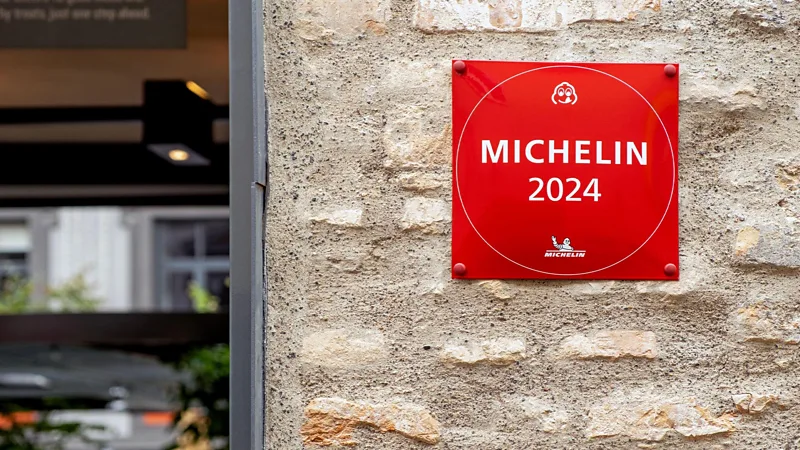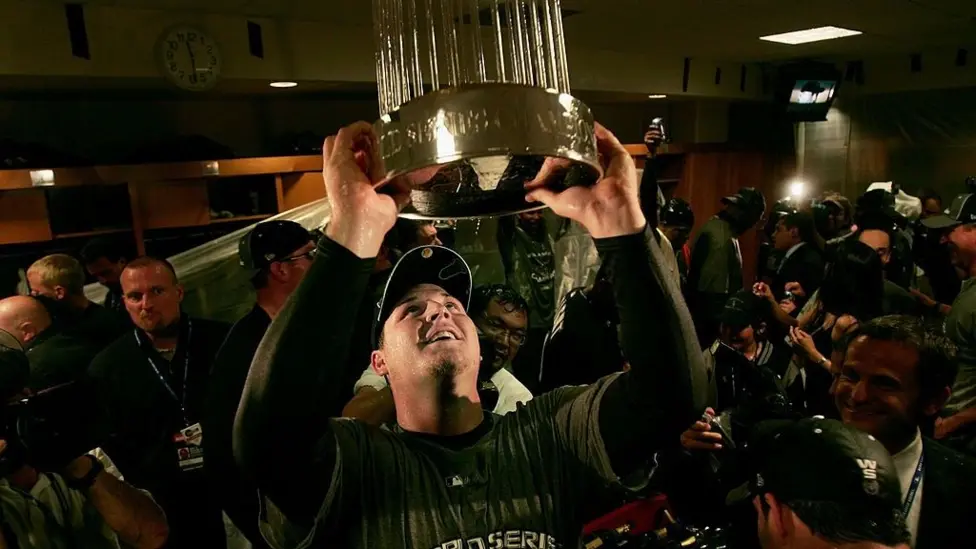How do restaurants actually get a Michelin star?
It's one of the highest culinary honours to be bestowed on a restaurant, but for decades, the process around how they're awarded has been shrouded in secrecy.

Will-they-won't-they romance aside, the most interesting plot point of the new season of Emily in Paris may be chef Gabriel's dream of obtaining a coveted Michelin star at his restaurant, l'Esprit de Gigi. From The Menu to The Bear, quite a few fictional chefs have been pursuing this illustrious distinction in recent years, and while Emily in Paris may get Paris so wrong, its treatment of the Michelin star's secrecy and solemnity is right on the money.
"Even for us, the Michelin Guide is a little hazy," said Julia Sedefdjian, who became France's youngest Michelin-starred chef at the age of 21. "It's not like we have a grading scale in front of us."
But given the tight-lipped anonymity of the Guide's inspectors, perhaps the best people to offer insight into what it really takes to earn a Michelin star are chefs.
BBC.com's World's Table "smashes the kitchen ceiling" by changing the way the world thinks about food, through the past, present and future.
The Michelin Guide began humbly in 1900 as a free guidebook for Michelin tyre customers indicating refuelling stations, hotels and restaurants. The three-star hierarchy only surfaced in 1931, with one-starred establishments said to be worth a stop, two-starred a detour and three-starred a whole trip. The contemporary Guide is shrouded in mystery, with an undisclosed number of inspectors reviewing more than 40,000 restaurants in more than 30 countries. France alone counts 639 Michelin-starred restaurants, of which 75 have two stars, and just 30 have three.
The murky waters of what makes a restaurant worthy are clearer to Chef Maxime Bouttier after 15 years working in starred kitchens across France, as well as a stint Les 110 de Taillevant in London. "I know how you can get a star," said the chef, who earned his first at Géosmine in March 2024. He cited "codes" like white tablecloths and soft piano music playing in the background, boxes some restaurateurs seek to tick. When Sedefdjian opened her Michelin-starred Baieta in Paris in 2018, she purposefully invested in beautiful tableware and stocked her wine cellar accordingly, even opening the restaurant in the space formerly occupied by Michelin-starred Itinéraires.
Sedefdjian's pursuit of stardom began far earlier, when she was just 14. She was attending culinary school and apprenticing at fine dining restaurant l'Aphrodite when it earned its first star. "I saw what it was to have a chef who had been waiting for his star for years, to finally succeed," she recalled. "It's something magical. I remember it as though it was yesterday, and it wasn't even mine."
Restaurant insiders might have suspected Emily in Paris' season-four reveal of "inspector" Marianne as an imposter, seeing as when it comes to a Michelin review, chefs are always kept in the dark. "We're never aware of the inspectors' visit," said Sedefdjian. "If they introduce themselves, it's only after they've eaten. And often – very often – they never introduce themselves at all."
That said, a few clues are portrayed nearly to perfection in the 2015 film Burnt, when the manager conveys some odd behaviour to the chef: two customers, one ordering the tasting menu, the other à la carte, have ordered a half-bottle of wine and – crucially – placed a fork on the floor. “We used to say that they would put silverware on the ground to see if the waiter picked it up right away,” Sedefdjian said.
Fans of The Bear suspect the show of toying with the same trope in season three, when Richie notices a fork on the dining room floor. But there was no fork at Baieta; indeed, if the solo diner in his 40s hadn't introduced himself afterwards, Sedefdjian would have been none the wiser. "You always think it's going to be an older person with a notebook."
After the inspection, most learn about the status of their stars at a much-publicised ceremony. But for new restaurants, Sedefdjian said, "Someone from the Guide calls you to let you know." As the ceremony loomed, however, "I started saying to myself, 'This isn't possible. They're not going to call. They're never going to call.'" And then, the day before the ceremony, an unlisted number popped up on her phone. "My heart started racing," she said. "It was someone from the Guide, calling to say, 'I wanted to let you know that your star is going to shine again.'"
Bouttier, too, began his path to stardom at 14, when, upon sharing his desire to cook for a living, his mother pressed him to attend hotel school. "It's a lot of theory, sitting on a chair," he said. "If I wanted to be in the kitchen, it's because I was sick of being on a chair!" They agreed on a compromise: that Bouttier seek an apprenticeship in a starred restaurant.
Fifteen years later, Bouttier opened Géosmine knowing he wanted a star – but on his own terms. "We don't have tablecloths," he said. "Our waiters are in Doc Martens. Our soundtrack is '80s rap. It's nothing like what we should have done to get a star." Nevertheless, Bouttier earned one less than a year after opening in April 2023.
His experience isn't an anomaly, according to trained chef, culinary instructor and gastronomy guide Allison Zinder. "What I've noticed in the past 10 years or so is a much higher focus on the ingredients and techniques and what's on the plate than the plates themselves," she said. "It's gotten much more simplified. It's less about the tablecloths."
In the trendy 11th arrondissement, Bouttier follows in the footsteps of neighbourhood pioneers like Bertrand Grébaut, whose Septime earned its first star in 2014 with waiters in sneakers and blue aprons, or Iñaki Aizpitarte, whose 2018 star at Le Chateaubriand came with nary a tablecloth to be found. Plates have evolved away from what Bouttier characterised as a "demonstration of technicity" where, often, "you didn't even recognise the original ingredient". Instead, contemporary Michelin-starred tables offer "far more rustic plates with a lot of cuisine behind them", he said. "Lots of sauces, lots of preliminary preparations, but on the plate, the visual seems far simpler. Far more accessible."
Earning a star can change things overnight for restaurateurs. L’Aphrodite closed temporarily to overhaul its galley-style kitchen into a grand cuisine, and Bouttier streamlined his offerings into a single prix-fixe menu. The most palpable changes, however, were beyond his control. "We've got a starred clientele now, and that clientele is much more annoying," he said, citing guests horrified to learn they cannot bring "dogs the size of cows" to dinner. For Sedefdjian, the main change is in mindset: "It brings a different sort of rigour."
The Bear and Burnt showcase the potential detriments of such an environment – on mental health and on lifestyle."You need to make a lot – a lot – of sacrifices," said Bouttier. He admitted his own meticulous nature has made him "not easy to work with".
"I'm only 32, but my management style is old-school," he said. "If you start at 08:00, you're in the kitchen at 08:00. If you want to have a coffee and change, you get there at 20 to 08:00.”
The pressure is only magnified by Bouttier's next goal: a second star. To get there, he believes he'll need to hire more staff and renovate his kitchen. He'll reduce the number of covers from 30 to 22, which means a price hike. But it'll be worth it.
"All of the places where I had fun as I was dining, in my life, were two-starred places," he said, noting that as a chef, two stars leaves you room to grow. "If you have three stars," he said, "you can lose them all."
The counterpoint to the joy of earning a Michelin star is the pain of losing one. The potential loss of his third star has been cited as a possible motivation behind Chef Bernard Loiseau's death by suicide in 2003; and after losing his third Michelin star in 2019, Chef Marc Veyrat demanded to be removed from the Guide entirely. It's perhaps no surprise that Emily in Paris' Chef Gabriel (spoiler!) is so relieved to learn, in season four, that he didn't actually get his star after all.
"I've always been motivated by [the pressure]," said Sedefdjian. "But I can understand that there are chefs out there who say it's too many obstacles."
For Bouttier, the trick is keeping things in perspective. Chefs blinded by stars "are the people who forget their identity", he said. "They will have cooked for years just to have that star, forgetting everything else."
Instead, both young chefs are keeping their culinary integrity at the forefront.
"The star rewards a rigour and a quality of work, and that's what's important," said Bouttier. "It's the path that gets you to the star. It's not really the star."
"We cook the way we want to cook," added Sedefdjian. "We have to like it, our clients have to like it. And then, if Michelin likes it, that's even better."
-BBC







